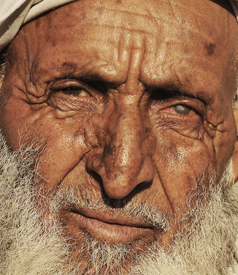Kabul, Afghanistan – Twelve Afghan civilians died Sunday after U.S. rockets mistakenly hit a house during the much-trumpeted offensive to clear the last Taliban stronghold in Helmand province, a loss of life that is likely to seriously undermine the operation and the renewed American-led mission to win the trust of the population.
The use of the rockets has been suspended pending a “thorough review” of the incident, the U.S.-led International Security Assistance Force said in a statement.
An Afghan soldier and a Marine were injured in the firefight that preceded the rocket attack, on the second day of an operation to take control of the town of Marjah and the surrounding district of Nad Ali.
Operation Moshtarak, which means “together,” is the biggest assault on the Taliban since the fall of the Islamic extremists’ government in 2001 and the first major test of the new U.S. strategy for quelling the insurgency and stabilizing Afghanistan. A centerpiece to the offensive has been to minimize civilian casualties and the use of force.
A combined force of U.S., Afghan and British soldiers continued to come under sporadic fire Sunday, while facing constant danger from Taliban-laid mines, roadside bombs and booby-traps.
The large number of civilian deaths in a single incident calls into question the approach to the operation, and provides easy propaganda points to the Taliban enemy. Most of the 80,000 residents of Marjah stayed in their homes, despite weeks of public build-up to the assault.
After managing to avoid civilian casualties on the first day of the operation, which was declared a success, Sunday — Day Two — brought disaster.
A Marine unit embedded with Afghan soldiers, which came under sustained fire from two directions, called in a strike from heavy-duty munitions known as a Himars, which is a rocket system fired from a truck. Two rockets landed some 300 yards off target, killing the 12 civilians and wounding one.
“We deeply regret this tragic loss of life,” said Stanley McChrystal, the U.S. general who leads international forces in Afghanistan. “The current operation in Central Helmand is aimed at restoring security and stability to this vital area of Afghanistan. It’s regrettable that in the course of our joint efforts, innocent lives were lost.”
McChrystal telephoned Afghan President Hamid Karzai to apologize for what he called the “unfortunate incident.” The Afghan leader had cautioned the forces, as the operation began, to “exercise absolute caution to avoid harming civilians.” The death of innocent Afghans in the war, often caused by misdirected air strikes, has inflamed public opinion in Afghanistan.
At issue is whether the use of the rockets was proportionate to the threat and why the weapon went so far wide of its intended target. The wrong co-ordinates could have been fed into the rocket launcher, or it suffered some technical failure, military officials believe.
An ISAF official, who could not be named because of the sensitivity of the issue, said that the rockets were used after enemy fire made it impossible for helicopters to come in to evacuate the two injured soldiers. As evening fell in Afghanistan on Sunday, the Marine and Afghan unit were still under fire, more than 10 hours after the engagement began, he said.
“This (Himars) is a heavy thing to use under these circumstances but they used something that is usually very precise,” the NATO official said. “They probably felt this was better than calling in an air attack.”
The scale of operation, involving 15,000 soldiers, a large civilian presence, together with hundreds of Taliban fighting desperately against hopeless odds, and a town rigged with booby-traps, make civilian losses inevitable, analysts believe.
McChrystal, the pioneer of a new counter-insurgency strategy in Afghanistan, is faced with a delicate balance: the need to safeguard his own forces and the imperative of preventing civilian casualties. He has issued a series of directives to rein in the use of force, in an effort to win over an Afghan population often alienated and terrified by the use of air strikes and raids on homes. But that has brought criticism from within the military and in the U.S. that he was hamstringing soldiers in the field and putting their lives at risk.
“Civilian casualties have been one of the big issues that have been troubling the relationship between President Karzai, the Afghan people and international forces,” said John Dempsey, head of the Afghanistan office of the U.S. Institute of Peace, an independent research organization.
So far in the operation, the Taliban resistance has been generally weak.
According to Dawood Ahmedi, a spokesman for the provincial governor of Helmand, 27 insurgents were killed so far, with five wounded and 11 arrested. The advancing force has uncovered 5,500 lbs of explosives.
“We are achieving our aims,” Ahmedi said, speaking before the news of the civilian deaths. “The problem we are facing is the enemy has buried many mines, so the forces have to fight with both the enemy and the mines.”
(Shah is McClatchy’s Special Correspondent.)
Join us in defending the truth before it’s too late
The future of independent journalism is uncertain, and the consequences of losing it are too grave to ignore. To ensure Truthout remains safe, strong, and free, we need to raise $31,000 in the next 48 hours. Every dollar raised goes directly toward the costs of producing news you can trust.
Please give what you can — because by supporting us with a tax-deductible donation, you’re not just preserving a source of news, you’re helping to safeguard what’s left of our democracy.
